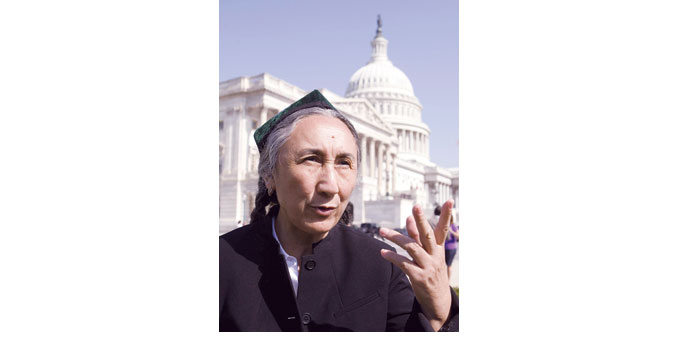By Bill Smith/Beijing/DPA
State media yesterday linked an attack in China’s capital to terrorism in the restive far western region of Xinjiang and warned of the possibility of more attacks.
Yet international analysts and rights groups insist that an upsurge in violence in the vast, impoverished region is at least partly a product of the ruling Communist Party’s policies in Xinjiang.
The party has promoted rapid economic development while strengthening its draconian policing of Xinjiang’s Uighurs, some of whom oppose Chinese rule.
“Clearly there’s something wrong with the policies in the region,” Dru Gladney, a US scholar who has written several books on ethnic relations in Xinjiang, said.
Gladney said the government had made “tremendous efforts” to crack down on Uighur unrest, particularly since rioting and ethnic conflict in the provincial capital, Urumqi, left some 200 dead and 1,600 injured in 2009, according to government figures.
“There has to be some serious rethinking of policy in the region,” he said.
Monday’s attack in Beijing is likely to spur a new crackdown and place all Uighurs in China “under general suspicion,” Ulrich Delius, Asia consultant for the German-based Society for Threatened Peoples, said yesterday.
But another crackdown could fuel more violence, and China’s leaders could only break the cycle “if they admitted the failure of the minority policies,” Delius said in a statement.
Beijing-based political commentator Zhang Lifan admitted the government had “failed to deal with ethnic problems” in Xinjiang and other regions.
“The central government doesn’t have a long-term, stable policy for ethnic issues and now ethnic conflicts are very sharp,” Zhang said.
Since last year, other Chinese scholars have urged the party to revise its policies, which include cultural assimilation of minorities and state control of religious activity.
But some of those calls are motivated by anger among Han Chinese, the dominant ethnic group who make up about 91% of China’s 1.34bn people.
Gladney said he found “strong anger” from some Han Chinese towards Uighurs and Tibetans during recent his visits to China.
Some Han feel that Uighurs, Tibetans and other minorities are ungrateful for the economic development brought to them in 64 years of communist rule.
At a national conference on assistance to Xinjiang from other regions in September, a senior party leader urged officials to provide more jobs and educational opportunities for ethnic minorities, especially in the poorest and most restive parts of southern Xinjiang.
“Xinjiang still faces many special difficulties in development and stability. It needs the support of the entire country,” Yu Zhengsheng, one of the seven members of the party’s all-powerful Politburo Standing Committee, was quoted as saying.
Yu encouraged more of Xinjiang’s minorities to seek work outside the region and “stressed bilingual and vocational education as well as education on ideology and politics,” the official Xinhua news agency said.
Some 8mn Uighurs make up about 40% of the 21.8mn people in Xinjiang. Many Uighurs complain of cultural and religious repression and claim that Han Chinese migrants enjoy the main benefits of development in the oil-rich but economically backward region.
Adding to their feelings of injustice are the perceived lack of respect by the party for traditional culture, language and religion, and its zero-tolerance policy towards organised opposition, separatist movements and independent religious groups.
The government has waged a battle against the “three evil forces” of religious extremism, separatism and terrorism for more than a decade. It has accused some Uighurs of having links to terrorist groups in neighbouring Pakistan, Afghanistan and Central Asia.
Police said the attack in which a car ploughed into a crowd and burst into flames in central Beijing was a “planned, organised, premeditated, violent terrorist attack” that left five dead and 40 injured.
The police reported finding a “religious extremist content” in the burnt-out car in which a Uighur man, his wife and mother died.
They said they recovered knives and a “jihad” flag from a temporary residence used by five Uighurs who confessed that they “conspired to plan and carry out the attack” with the three who died in the car.
“All you can say is, this is another example of Uighur discontent,” Gladney said. “It doesn’t have any of the hallmarks of Al Qaeda terrorism or organised terrorism.”
“It’s an unfortunate example of Uighur discontent,” he said, adding that the attack appeared more likely to be the work of “unbalanced individuals” than an organised terrorist group.
“What’s lacking is evidence of a large-scale network,” Gladney said of the government’s efforts to equate attacks in Xinjiang with international terrorism.
“A lot of these incidents that we’ve seen are civil unrest [and] very personal,” he said.
World Uighur Congress President Rebiya Kadeer in Washington in this file photo. The exiled leader of China’s Uighur ethnic minority community has called for an international investigation into an incident in which a car ploughed into pedestrians in Beijing, after Chinese authorities arrested five suspected Uighurs over the attack.

World Uighur Congress President Rebiya Kadeer in Washington in this file photo. The exiled leader of China’s Uighur ethnic minority community has call
